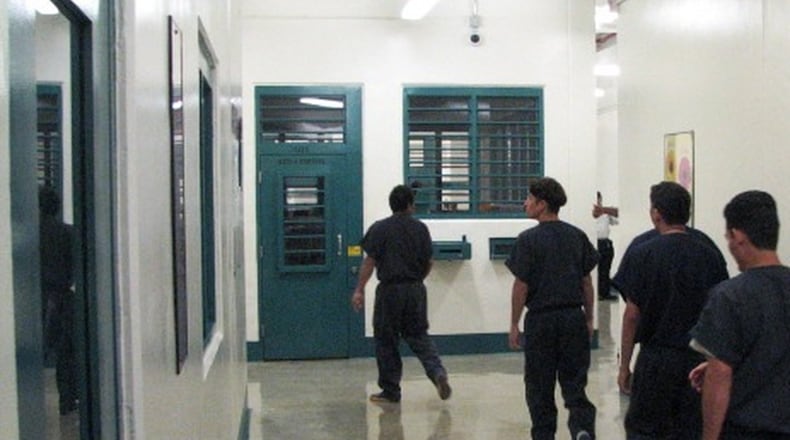Three men who have been held in a South Georgia immigration detention center filed a federal class-action lawsuit this week against the private company that operates the facility, alleging the company is forcing detainees to cook and clean there for as little as $1 a day as part of a profit-making scheme.
Filed Tuesday in the U.S. District Court in Columbus, the lawsuit accuses Nashville-based CoreCivic of threatening to put detainees in solitary confinement and deprive them of food, toiletries and contact with loved ones, if they don’t work inside the Stewart Detention Center. CoreCivic operates the center through agreements with U.S. Immigration and Customs Enforcement and Stewart County.
The plaintiffs include Wilhen Hill Barrientos, a Guatemalan national who is seeking asylum in the United States; Margarito Velazquez Galicia, a Mexican citizen who is seeking a deportation reprieve; and Shoaib Ahmed, a citizen of Bangladesh who unsuccessfully sought asylum here. Barrientos and Galicia are still held at Stewart.
The plaintiffs said they have worked in the detention center kitchen. Their lawsuit says CoreCivic operates a commissary in Stewart and that it is the only place where detainees can buy hygiene products, clothes, food and phone cards.
The Southern Poverty Law Center; Project South; R. Andrew Free, an immigration attorney; and the law firm of Burns Charest are representing the plaintiffs. Similar lawsuits have been filed in California, Colorado Texas and Washington, according to the SPLC.
RELATED: Georgia lawmakers back $1 a day pay in immigration detention centers
“When I arrived at Stewart I was faced with an impossible choice — either work for a few cents an hour or live without basic things like soap, shampoo, deodorant, and food,” Barrientos said in a statement released through the SPLC. “If I didn’t work, I would never be able to call my family.”
ICE’s standards allow for volunteer work in its detention centers.
“Detainees shall be able to volunteer for work assignments but otherwise shall not be required to work, except to do personal housekeeping,” ICE’s 2011 Performance-based National Detention Standards say.
An ICE spokesman referred questions to CoreCivic about its operations at Stewart. CoreCivic released a statement saying all work programs in its ICE detention centers are “completely voluntary and operated in full compliance with ICE standards, including federally mandated statutory reimbursement rates for voluntary work program participants.”
“We have worked in close partnership with ICE for more than 30 years,” CoreCivic spokesman Jonathan Burns said in an email, “and will continue to provide a safe and humane environment to those entrusted to our care.”
About the Author
Keep Reading
The Latest
Featured




